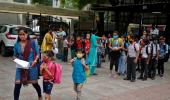A 37-year-old fully vaccinated man who arrived in Delhi from Tanzania has tested positive for Omicron, making it the first case of the new COVID-19 variant in the national capital.

The patient, a resident of Ranchi, had travelled from Tanzania to Doha and from there to Delhi on a Qatar Airways flight on December 2.
He stayed in Johannesburg, South Africa, for a week, officials told PTI.
The person is 'fully vaccinated' and is currently admitted to the Lok Nayak Jai Prakash Narayan (LNJP) Hospital with 'mild symptoms', an official said.
"He had to take a connecting flight to Ranchi, where he lives with his family. Since he gave his sample at the IGI Airport which came out positive, we admitted him to the Lok Nayak Hospital as per the procedure," the official said.
Authorities are trying to locate and isolate 10 people who occupied the seats close to this passenger on the flight.
Delhi's Health Minister Satyendar Jain said 17 COVID-19 patients and six of their contacts have been admitted to the Lok Nayak Hospital so far.
"The Omicron variant has been found in one of the 12 samples sent for genome sequencing so far, according to a preliminary report," he said.
"The patient complained of sore throat, fever and body ache. He is stable now," Medical Director Suresh Kumar said.
The Delhi health minister said banning international flights is the most effective way to contain the spread of the Omicron variant.
It is being reported that the gestational period in the case of Omicron could be more than other variants. This means an infected person may go undetected at the airport All the cases have come from affected foreign countries. The central government should take it seriously, he said.
Jain said that there is a 99 percent chance that the mask can save people from all COVID-19 variants, be it Alpha, Beta, Delta or Omicron.
Experts have been saying that the third wave of COVID-19 can hit the country in January-February. It can be prevented if everybody wears a mask, he said.
The minister said more than 90 percent of the eligible population has got the first dose of the COVID-19 vaccine.
Sixty percent of the people have got the second dose. We appeal to the remaining people to get vaccinated as soon as possible, he said.
Jain said more than one lakh people are being vaccinated against COVID-19 in Delhi every day.
"If we continue at the same speed, everyone will be covered soon," the minister said
He pointed out that many people have not received their second dose of Covishield yet due to the large gap (84 days) between the doses.
In response to a question on a booster dose, the minister said the Delhi government will follow the notification of the central government and the recommendations of experts.
The country reported the first two cases of the Omicron variant of COVID-19 on Thursday in Karnataka -- a 66-year-old South African flyer and a 46-year-old Bengaluru doctor with no travel history. Both men are fully vaccinated.
On Saturday, a 72-year-old NRI man from Gujarat and a 33-year-old man from Maharashtra tested positive for the new strain.
All COVID-positive international travellers are being admitted to the LNJP Hospital, where a dedicated ward has been set up for isolating and treating them.
Under the new norms, RT-PCR tests are mandatory for passengers arriving from the 'at-risk' countries and they will be allowed to leave the airport only after the results come.
According to the Centre, the countries designated as 'at-risk' are European countries, including the United Kingdom, and South Africa, Brazil, Botswana, China, Mauritius, New Zealand, Zimbabwe, Singapore, Hong Kong and Israel.
Also, two percent of the passengers arriving on flights from other countries will be subjected to the test randomly.
Delhi reported 63 coronavirus cases and zero deaths on Sunday, as the positivity rate rose marginally to 0.11 percent, according to data shared by the city's health department.
With the fresh cases, the overall infection tally in the city rose to 14,41,358 while the death toll was 25,098.
The number of active cases is 370, of which 144 are in home isolation.










